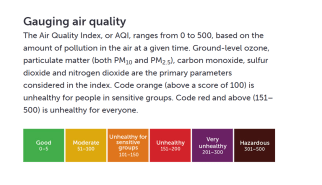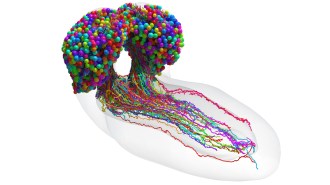Search Results
Bee Geometry
How clever! Bees use geometry tricks to make the most of their hive’s space. Learn how bees, wasps and other hive-makers accommodate changes in their colony’s needs, answer questions about evolution’s approach to problem-solving and discuss the strengths and weaknesses of analogies as literary devices.

Health Effects of Climate Extremes and Thermal Technology
Climate extremes are impacting human health and inspiring new technology. This guide provides lesson plans paired to recent news articles covering a new thermal fabric prototype and its ability to regulate temperature and how wildfire smoke impacts the air quality index and human health.
Keep up with your air quality
Air pollution and wildfire smoke are affecting many areas of the country. Check your air quality index and learn how poor air quality could impact your health with this quick activity!
Not too hot. Not too cold
Staying cool in the summer and keeping warm in the winter may
become easier. Learn about a new thermal fabric prototype and its ability to regulate temperature,
answer questions about its design and function and discuss potential applications.
How Erosion Alters the Landscape
When wind and water move, they don’t move alone — they take parts of the land with them. In this activity, students will investigate how water carries sediments from one location to another via erosion and will explore how this natural process can alter the landscape.

Climate Change Spikes Baseball Homers
Baseball fans love numbers and explaining every nuance of baseball statistics. In this Guide, students will learn how climate change is boosting home runs and study the physics behind the increase in homers.
Applying the ideal gas law
Summary: Students will review the ideal gas law and use a simulation to explain the assumptions made in a recent study about how climate change is impacting baseball.
Learning Outcomes: Exploration of the cause and effect of manipulating conditions of a gas using a simulation, identifying relationships of variables using a mathematical equation and application of theoretical concepts to real-world examples.
Confounding Life and Science Research
In this quick activity, students will discuss confounding factors in their own lives and in scientific research to determine why it is important to identify and control for those factors.
Learning Outcomes: Reviewing confounding factors and learning why it is important to identify them in science.
How heat and home runs are connected
Students will answer questions about the online Science News article “Baseball’s home run boom is due, in part, to climate change,” which explores how increases in temperatures boost home run numbers. A version of the article, “Climate change spikes baseball homers,” appears in the May 6, 2023 & May 20, 2023 print issue of Science News.
What’s Going On in the Animal Mind?
Some scientists studying animal behavior are interested in whether nonhuman animals are intelligent and self-aware. In this activity, students will explore recent research and draw on their own experiences to consider how intelligence is defined and that definition might differ from one species to another.

The Fruit Fly Brain in Exquisite Detail
Scientists study the tiny fruit fly to understand how organisms work. In this Guide, students will learn how scientists mapped the nerve cells in a larval fruit fly brain — a task that took 12 years — and learn about those cells.
Counting connections in a tiny brain
Students will answer questions about the online Science News article “Scientists have mapped an insect brain in greater detail than ever before,” which explains how researchers approached finding more than 500,000 neural connections in the larval fruit fly brain. A version of the article, “The fruit fly brain in exquisite detail,” appears in the April 22, 2023 issue of Science News.